8 Best Stock Brokers That Allow You to Invest in Fractional Shares
A majority of Americans — about 55% — reported owning stock, according to a Gallup poll. That figure hasn’t changed much, even as the rise of robo-advisors and commission-free trading increased market access and reduced costs for everyday investors.
Though by and large, they’re better off than Americans who don’t own stock, most of those who do wouldn’t consider themselves wealthy. Favorable tax treatment of employer-sponsored and individual retirement investing accounts boosts middle-class stock ownership, bringing the ups and downs of the market within reach to those without gobs of disposable income.
Recent innovations in investing technology have further increased accessibility. Witness the growing number of online stock brokers and investing apps that allow investors to buy and sell fractional shares — small slices of stock. Fractional share purchases let low-asset investors build diversified portfolios and take advantage of dollar-cost averaging (executing multiple share purchases over time to smooth out price volatility).
Both of these can improve returns and reduce risk over time. With shares in the most sought-after stocks routinely trading over $100 apiece — and sometimes far higher — fractional investing is no small thing.
If the opportunity to invest in fractional shares is high on your list of must-haves in an online broker or investing app, you’re in luck — plenty of reputable platforms have this capability. They include:
- Traditional full-service brokerages with a variety of taxable and tax-advantaged account types
- Financial apps offering capabilities like cash management accounts, do-it-yourself or managed investments, often with very low account minimums
- Leading robo-advisors with taxable accounts and IRA options
There are so many brokerages that allow fractional share investing to choose from, the only thing left to do is decide which one is right for you.
Fractional Share Investing Brokerages
These online stock brokerages all offer fractional share trading as well as traditional full share trading, usually with no monthly fee. Use them to trade stocks, mutual funds, and other market-traded instruments.
1. Robinhood
Robinhood  was one of the first online brokerages to offer commission-free trading. Now that its innovation has spread across the investing world, Robinhood is setting its sights on another frontier: fractional shares.
was one of the first online brokerages to offer commission-free trading. Now that its innovation has spread across the investing world, Robinhood is setting its sights on another frontier: fractional shares.
Though you can currently only join the waitlist, there’s no cost to join or obligation to participate once it’s rolled out. In the meantime, enjoy fantastic features like a high-yield cash management account and access to alternative investments like cryptocurrencies and precious metals.
- Plans and Pricing: Robinhood offers commission-free cash trading, but certain transaction types and account activities can produce fees, and standard regulatory fees apply. See Robinhood’s complete fee disclosure document for more details.
- Account Opening Bonus: For a limited time, apply for a new Robinhood brokerage account and get approved to get a free stock worth $2.50 to $200 (or more) per share.
- Minimum Required to Invest: There’s no minimum deposit required to open an account.
Learn More
2. Stash
Stash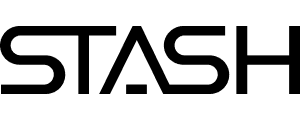 is a micro-investing platform built around the concept of fractional share investing. The most significant difference between Stash and competitors like M1 Finance and Betterment is its self-directed approach that gives investors — even those just starting — total control over their portfolios’ composition.
is a micro-investing platform built around the concept of fractional share investing. The most significant difference between Stash and competitors like M1 Finance and Betterment is its self-directed approach that gives investors — even those just starting — total control over their portfolios’ composition.
With Stash, you can invest as little as $0.01 in individual stocks, ETFs, and bonds and can entirely avoid fund expenses when your portfolio contains stocks and bonds alone.
All Stash plans come with a taxable investing account and a checking account with two great features: fractional stock rewards on all eligible transactions and an accelerated payday feature. If your employer qualifies for the payday feature, you could get your paycheck up to two days early each pay period. Higher-priced Stash plans offer tax-advantaged retirement accounts and custodial investing accounts for up to two kids. Both types offer fractional investing as well.
Stash’s Auto-Stash feature is available at all price points. It offers three features that promote regular investing: recurring investment settings (usually weekly or monthly), a round-up-the-change feature that rounds every checking debit card purchase to the nearest dollar and invests the difference, and a smart investing tool that automatically moves excess funds from your checking account to your investing account.
- Plans and Pricing: Stash has three plans: Beginner ($1 per month), Growth ($3 per month), and Stash+ ($9 per month). Beginner comes with one taxable investing account, a checking account with early payday, fractional stock rewards on transactions (Stock-Back), and free financial education tools. Growth adds a tax-advantaged retirement account. Stash+ adds custodial investing accounts for up to two kids, a metal debit card with twice the Stock-Back rewards, and a monthly market insights report.
- Account Opening Bonus: $5.
- Minimum Required to Invest: The account opening minimum is just $1.
For more information, check out our Stash review.
Learn More
3. M1 Finance
M1 Finance is a digital money management app with a free checking account, a low-cost borrowing solution, and an automated investing platform that’s free for base plan holders. The investing solution, known as M1 Invest, offers dynamically rebalanced, fully customizable portfolios with built-in fractional share investing in more than 80 exchange-traded funds (ETFs).
is a digital money management app with a free checking account, a low-cost borrowing solution, and an automated investing platform that’s free for base plan holders. The investing solution, known as M1 Invest, offers dynamically rebalanced, fully customizable portfolios with built-in fractional share investing in more than 80 exchange-traded funds (ETFs).
M1 Finance’s big selling point relative to other digital investing platforms is M1 Borrow, a portfolio lending tool that offers very low-cost financing secured by the value of the account holder’s investment portfolio. When you upgrade to M1 Plus ($125 per year), you unlock M1 Borrow loans at just 2% APR — a better deal than home equity loans and lines of credit and roughly equivalent to the lowest auto loan rates available.
If you don’t own your own home or have yet to accumulate the equity necessary for home equity financing, M1 Borrow could be your best shot at unlocking substantial sums of low-cost capital.
- Plans and Pricing: M1 Finance has two plans: a base plan (M1 Finance) and a premium plan (M1 Plus) that costs $125 per year. M1 Plus benefits include a second daily trading window (compared with one for the base plan) plus a 1% yield on checking balances and 1% cash back on checking transactions.
- Account Opening Bonus: None.
- Minimum Required to Invest: There’s no minimum required to invest with M1 Finance.
For more information, check out our M1 Finance review.
Learn More
4. Betterment
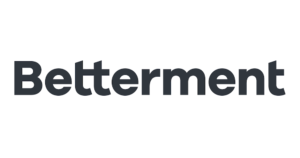 Founded during the depths of the late-2000s financial crisis, Betterment is the original robo-advisor and one of the first online investing platforms to offer fractional share investing to the masses. It remains a leader in the managed investing space, specializing in tax-optimized, custom-allocated portfolios for passive investors.
Founded during the depths of the late-2000s financial crisis, Betterment is the original robo-advisor and one of the first online investing platforms to offer fractional share investing to the masses. It remains a leader in the managed investing space, specializing in tax-optimized, custom-allocated portfolios for passive investors.
Betterment’s purpose-built portfolios contain low-cost ETFs that track specific indexes, sectors, and asset classes. Fractional share investing is built into its investing model thanks to unlimited portfolio rebalancing and automatic dividend reinvestment features that spread relatively small sums of cash among multiple securities.
Betterment keeps net costs low by waiving transfer and trading fees — the only fees you pay are its flat management fee calculated as an annualized percentage of assets under management (AUM) and fund expenses that Betterment can’t control.
Betterment also offers two daily money management tools: Betterment Checking, which has a potentially generous rewards program (Betterment Cash Back Rewards); and Betterment Cash Reserve, which has a high yield for a cash management account (though it’s variable with prevailing rates). Both are FDIC-insured, basically fee-free, allow unlimited inbound and outbound transfers, and charge virtually no fees. You can transfer money from these accounts into your investing account at any time.
- Plans and Pricing: Betterment has two plans: digital (0.25% AUM on all balances) and premium (0.40% AUM on all balances, with a $100,000 minimum). Premium features include comprehensive guidance on non-Betterment investments (such as employer-sponsored retirement plans) and direct, unlimited access to Betterment’s certified financial planner professionals for advice on major life events, such as marriage and buying a house.
- Account Opening Bonus: Get up to one year managed free with a qualifying account opening deposit. Deposit $15,000 to $99,999 to get one month managed free, $100,000 to $249,999 to get six months managed free, or more than $250,000 to get the full year managed free.
- Minimum Required to Invest: There are no account opening minimums or ongoing minimums to invest.
Learn More
5. Public
Public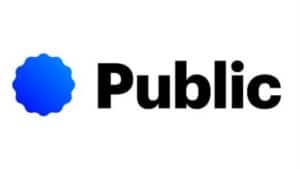 is a social investing platform that puts fractional shares at the heart of its operations. Users can invest directly (and commission-free) in “stock slices” worth as little as $5 apiece, regardless of the price of the underlying shares, and Public promotes socially responsible investing — both critical selling points for younger investors.
is a social investing platform that puts fractional shares at the heart of its operations. Users can invest directly (and commission-free) in “stock slices” worth as little as $5 apiece, regardless of the price of the underlying shares, and Public promotes socially responsible investing — both critical selling points for younger investors.
If you’d prefer not to invest in individual stocks, Public offers a range of low-cost index funds with no commissions. Once you’re up and running, use Public’s social messaging tool to stay in touch with your fellow investors and discuss your investments.
- Plans and Pricing: Public offers commission-free trading for all customers, but certain account actions can result in fees. Likewise, index funds can carry expenses and fees that Public can’t control. See Public’s account disclosures for a full list of possible fees.
- Account Opening Bonus: There’s currently no account opening bonus. Check back for the latest offers.
- Minimum Required to Invest: You can begin investing with as little as $5. There’s no ongoing minimum balance requirement.
Learn More
6. Fidelity
 Fidelity is a full-service online stock broker with commission-free stock and ETF trades with fractional share investing capabilities, a robo-advisor platform with relatively low fees and no minimums (and fractional shares), and a hands-on wealth management arm (also with fractional shares) for investors who can bring at least $50,000 in investable assets to the table.
Fidelity is a full-service online stock broker with commission-free stock and ETF trades with fractional share investing capabilities, a robo-advisor platform with relatively low fees and no minimums (and fractional shares), and a hands-on wealth management arm (also with fractional shares) for investors who can bring at least $50,000 in investable assets to the table.
Fidelity has a vast library of no-fee Fidelity ETFs for self-directed investors looking to skip out on fund fees and build truly fee-free portfolios. For hands-off investors, there’s the Fidelity Go robo-advisor and the Fidelity Personalized Planning & Advice hybrid platform instead. Both offer semi-customized portfolios built around your specific objectives and risk tolerance. Both also offer some input from human advisors and dynamic rebalancing using fractional shares.
- Plans and Pricing: With no commissions on stock and ETF trades and a slew of no-fee Fidelity ETFs, Fidelity’s self-directed solution has virtually no fees. Fidelity Go (robo-advisor) charges a flat fee of 0.35% AUM on balances above $50,000, $3 per month on balances between $10,000 and $50,000, and no fee on balances below $10,000. Fidelity Personalized Planning & Advice (hybrid robo-advisor and human-aided coaching) charges a flat fee of 0.50% AUM. The wealth management arm charges advisory fees ranging from 0.50% AUM to 1.50% AUM, depending on the balance invested. The private wealth management arm, a white-glove service for high-asset investors, charges fees ranging from 0.20% AUM to 1.04% AUM, depending on balance.
- Account Opening Bonus: There’s presently no account opening bonus.
- Minimum Required to Invest: There’s no minimum deposit required to open a Fidelity self-directed account or Fidelity Go robo-advisor account. You need at least $25,000 across all enrolled accounts to open a hybrid robo-advisor and coaching account. Wealth management accounts require at least $50,000, with dedicated advisors available from $250,000. Private wealth management services start at $2 million.
Learn More
7. SoFi Invest
SoFi Invest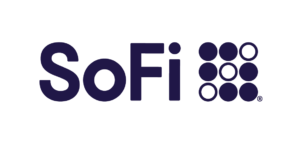 is a very low-cost investing app with a massive cache of fractional shares, known at SoFi as Stock Bits, in denominations starting at $1. New investors can easily build diversified self-directed (Active Invest) portfolios using only Stock Bits. Stock Bits are also integral to SoFi Invest’s managed portfolio solution, which offers dynamic rebalancing and dividend reinvestment, both made possible with fractional shares.
is a very low-cost investing app with a massive cache of fractional shares, known at SoFi as Stock Bits, in denominations starting at $1. New investors can easily build diversified self-directed (Active Invest) portfolios using only Stock Bits. Stock Bits are also integral to SoFi Invest’s managed portfolio solution, which offers dynamic rebalancing and dividend reinvestment, both made possible with fractional shares.
Active Invest portfolios charge no commissions on stock or ETF transactions. SoFi’s managed portfolio’s solution is management fee-free, though the funds in which SoFi invests charge management fees over which SoFi has no control.
Although it doesn’t really intersect with the platform’s fractional share investing capabilities, SoFi Invest does have a significant advantage over more traditional brokerages: cryptocurrency investing. SoFi Invest remains one of the few SIPC-insured investing platforms to offer crypto access.
- Plans and Pricing: SoFi has self-directed (Active Invest) and managed portfolio options. Neither charges commissions or management fees, and both utilize fractional shares (Stock Bits). However, managed portfolios carry some third-party fund fees and expenses that SoFi can’t control.
- Account Opening Bonus: For a limited time, earn up to $1,000 in free stock when you download the SoFi Invest app and open a new Active Invest account.
- Minimum Required to Invest: The account opening minimum is just $1 for Active Invest and automated investing accounts.
For more information, check out our SoFi review.
Learn More
8. Stockpile
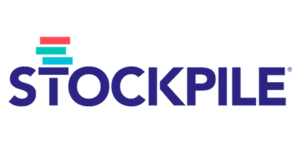 Stockpile is a low-cost self-directed investing platform that offers direct access to fractional shares in more than 1,000 stocks and ETFs, with no fees or minimums. The platform is for novice investors looking to invest in companies they patronize or care about. Its innovative stock search feature is smart enough to serve up parent companies of popular brands (for instance, a search for “ESPN” pulls up Disney).
Stockpile is a low-cost self-directed investing platform that offers direct access to fractional shares in more than 1,000 stocks and ETFs, with no fees or minimums. The platform is for novice investors looking to invest in companies they patronize or care about. Its innovative stock search feature is smart enough to serve up parent companies of popular brands (for instance, a search for “ESPN” pulls up Disney).
Stockpile has some other features worth noting, including custodial investment accounts for kids and teens and the ability to give stock to others via electronic or physical gift cards.
- Plans and Pricing: Stockpile has a single plan for self-directed investors. Trades cost $0.99 apiece, with no additional fees or minimums required by Stockpile. ETFs generally charge fees and expenses that Stockpile can’t control, however.
- Account Opening Bonus: There’s presently no account opening bonus. Check back for the latest offers.
- Minimum Required to Invest: The account opening minimum is $5, but there’s no ongoing investment minimum.
Learn More
Final Word
Fractional share investing is a vital tool for any investor, particularly novices and those on the lower rungs of the economic ladder. It’s much easier to build and grow a diversified portfolio when you’re not bound to purchase at least one whole share of a high-flying stock or fund. Fractional share investing also removes the temptation to pick stocks — often an unwise strategy for nonexperts — when your investable assets aren’t sufficient to create a balanced portfolio.
Each of these brokerages and investing apps get it. Perhaps it’s time you opened an account with one.
Published at Fri, 29 Jan 2021 18:00:12 +0000




Comments
Loading…